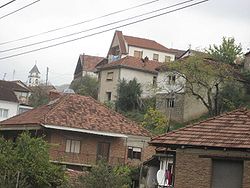- Janjevci
-
Janjevci Total population 10,000 approx. Regions with significant populations  Kosovo,
Kosovo,  Croatia
CroatiaLanguages Religion Related ethnic groups Torlaks (Krashovani & Gorani) & other South Slavs
Part of a series of articles on Croats  RecognizedCroatia
RecognizedCroatia
Bosnia and Herzegovina
Serbia (Vojvodina)
Kosovo
Austria
Italy
Montenegro
Romania
Slovakia
HungarySubgroupsJanjevci (Croatian pronunciation: [ˈjaːɲeftsi]) are Croatian inhabitants of the Kosovo town of Janjevo and surrounding villages, located near Pristina as well as villages centered on Letnica near Vitina (Papare, Vrmez, Vrnavo Kolo).
Contents
Origin and history
The Janjevci as a specific group is one of two regional communities in Kosovo who nationally identify as Croats. They belong to the Slavic ethnicities and are believed to be mostly descended from traders who settled in Kosovo during the 14th century from the Dubrovnik, Croatia. They have maintained their Catholic faith throughout the centuries.
The first written mention is by pope Benedict XI in 1303, mentioning Janjevo as the center of the catholic parish of Sveti Nikola.
Because of rising anti-Croat rhetorics and warmongering in Serbian media (especially in Serb media on Kosovo) in late 1980s[citation needed], and all the pressure and incidents[citation needed] arising from that, Croats from Janjevo and Letnica and other Croat-inhabited villages were more and more forced to leave Kosovo. They mostly migrated to Croatia.
The second wave of leaving Kosovo, came during Kosovo War.
In 1992, some inhabitants from Letnica, another Croatian village in Kosovo, emigrated to Croatia and broke in, and illegally settled in abandoned homes of Serbs in the villages of Voćin, Đulovac and Varešnica in western Slavonia[citation needed].Many of the Janjevci settled in Serb homes in inner Dalmatia in 1996[citation needed]. After the return of Serb refugees, the village became divided between two hostile communities. The Janjevci have since returned the Serb houses to their owners and instead built properties for themselves in a new part of Kistanje called Novo Naselje (lit. New Settlement).
Janjevci families started migrating to Croatia in the 1950s, with most settling in Zagreb. By the beginning of the 1970s, there was a large community of Janjevci along and within the vicinity of Konjšćinska Street in Dubrava, city district of Zagreb. They have since turned this area into a vibrant shopping district.
Population
According to records in 2002, there are 966 families of Janjevci in Croatia, with the majority of them residing in the capital Zagreb (669 families), and the rest in other parts of Croatia (297 families).
Before 1991, there were 8,062 Janjevci in Kosovo. In 1998 about 1,300 remained. After the Kosovo War, in Janjevo itself only around 350 remained, the rest fled mostly to Croatia.
Post war situation in Kosovo
The present situation for Croats in Kosovo is as described: 'With the downfall of Milošević's policy in Kosovo and with the exodus of most of the Serb population, the survival of the remaining Croat population also became uncertain. Albanian plunderers from neighbouring villages terrorised them and as a result they asked Croatia to help them leave Letnica collectively.[1]
There is an attempt in progress to find a proper place for them in Croatia, and to enable it to take them all together on secure ground.
Present situation
In 2007, there are only 320 Croats estimated to live in Janjevo.[citation needed] The community is slowly moving to Croatia, while Albanians and Roma are buying their properties in Janjevo.[citation needed] The remaining Croats of Janjevo have given their support for an independent Kosovo, but they have said if the conditions in Janjevo do not improve very soon they will all leave Kosovo for Croatia in one last group.[citation needed]
In the municipality of Vitina, in which the village of Letnica is, there are only 60 Croats left according to the 2003 Kosovo population census.
On 28 January 2008, the same day Amnesty International published its report on human rights abuses in Kosovo,a representative of the Croat community in Janjevo, Nikola Brkić, informed the media that the homes of two Croats, Luka Jožić and Roka Čibarlić, in the Šišarka village near Janjevo, had been demolished.
See also
References
- ^ http://www.hrt.hr/arhiv/hrvati_u_svijetu/izbor_iz_emisija/11-99/hrvati_s_kosova_eng.html[dead link]
External links
Ethnic groups in Kosovo Demographic history of KosovoEthnic groups in Serbia Central Serbia Serbs · Albanians · Bosniaks · Ethnic Muslims · Bulgarians · Croats · Macedonians · Montenegrins · Roma · Romanians (Vlachs) · YugoslavsVojvodina Banat Bulgarians · Bunjevci · Croats (Šokci) · Germans (Danube Swabians and Banat Swabians) · Hungarians (Szekelys) · Montenegrins · Macedonians · Pannonian Rusyns · Roma · Serbs · Slovaks · Yugoslavs · Romanians · Czechs · Slovenes · Gorani people · Ukrainians · Albanians · RussiansKosovo[a] ^a Kosovo is the subject of a territorial dispute between the Republic of Serbia and the self-proclaimed Republic of Kosovo. The latter declared independence on 17 February 2008, while Serbia claims it as part of its own sovereign territory. Its independence is recognised by 85 UN member states.Categories:- Ethnic groups in Kosovo
- Croatian diaspora
- Slavic ethnic groups
- South Slavs
Wikimedia Foundation. 2010.


